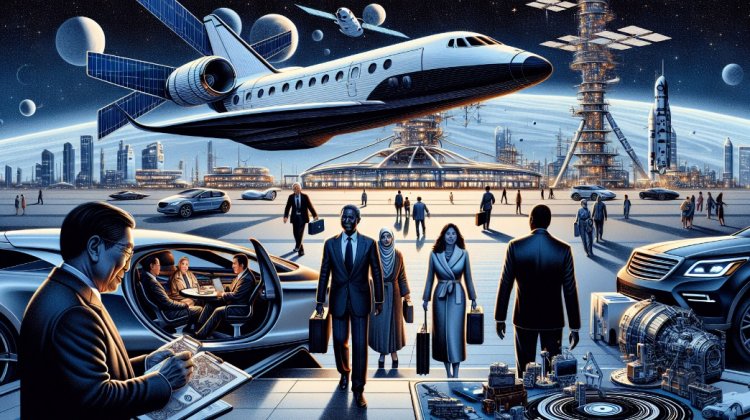15 Industries That Make Billionaires
Discover the 15 industries that have minted the most billionaires. From tech giants to luxury goods, explore the lucrative sectors creating immense wealth and shaping global economies.

1. Space Exploration and Commercial Space Travel
-
Technological advancements in space exploration
-
Untapped resources in space
-
Infrastructure development
-
Space tourism
-
Innovation and prestige in the industry
The space exploration and commercial space travel industry is experiencing significant growth and attracting the attention of billionaires like Jeff Bezos, Richard Branson, and Elon Musk. This industry offers numerous opportunities for financial success and innovation.
Technological advancements in space exploration
Breakthroughs in technology have made space exploration and commercial space travel more feasible and cost-effective. Reusable rockets, efficient propulsion systems, and lighter materials have paved the way for significant financial returns and the opening of new markets. Billionaires recognise the potential for technological advancements to drive the industry forward and generate substantial profits.
Untapped resources in space
Space is home to vast amounts of untapped resources, such as rare Earth elements and water on celestial bodies like the moon and asteroids. These resources can be mined and utilised for both space-based projects and applications on Earth, creating lucrative opportunities for investors and entrepreneurs. Billionaires are drawn to the potential for immense wealth and the exploration of infinite resources in outer space.
Infrastructure development
As more organisations venture into space, there is a growing need for infrastructure to support their activities. This includes satellite networks for communication, space stations for research and habitation, and refuelling stations for spacecraft. Investing in this infrastructure can result in significant financial returns and market dominance. Billionaires recognise the potential for long-term profitability in supporting the growth of the industry.
Space tourism
Commercial space travel is an emerging market, with companies like SpaceX, Blue Origin, and Virgin Galactic working on developing spacecraft to take tourists to space. This presents a unique opportunity for billionaires to invest in an industry that can generate substantial revenue and create new billionaires. The demand for space tourism is already significant, and as it continues to grow, so will the financial rewards for those invested in the industry.
Innovation and prestige in the industry
Space exploration has historically been a source of national pride and a driver of technological innovation. Billionaires investing in space ventures not only have the potential for financial gains but also bring a sense of prestige and the ability to contribute to humanity's progress and understanding of the universe. The success and breakthroughs achieved in the space industry can greatly enhance an individual's reputation and increase their wealth.
2. Tech Industry
-
Lower capital requirements and rapid growth
-
Network effects and exponential growth
-
Global reach and revenue streams
-
Examples of tech billionaires
The tech industry is a prominent source of billionaires, characterised by lower capital requirements and rapid growth. Unlike traditional industries, tech companies can grow quickly with relatively low capital investment due to their digital nature.
Lower capital requirements and rapid growth
Tech companies often have lower capital requirements compared to traditional industries. Their core products or services are often digital, allowing for replication and distribution at minimal cost. This enables tech entrepreneurs to reach vast audiences and experience exponential growth in a short period of time.
Network effects and exponential growth
The concept of network effects plays a crucial role in the success of tech companies. The value of a product or service in the tech world often increases as more people use it. This creates a cycle of growth where more users attract even more users, leading to exponential growth and dominance in the market.
Global reach and revenue streams
The global nature of the tech industry allows for unprecedented reach and revenue streams. With the internet connecting billions of potential customers worldwide, tech entrepreneurs can tap into diverse markets and create innovative solutions to cater to their needs. This global reach opens up opportunities for immense wealth generation.
Examples of tech billionaires
Notable examples of tech billionaires include Jeff Bezos, the founder of Amazon, and Elon Musk, the CEO of Tesla and SpaceX. These individuals have leveraged technological advancements and innovative business models to amass substantial wealth in the tech industry. Their success serves as inspiration for aspiring entrepreneurs in the tech sector.
3. Artificial Intelligence and Machine Learning
-
Revolutionising various industries
-
Scalability and low marginal costs
-
High barrier to entry
-
The dominance of companies like OpenAI
The artificial intelligence (AI) and machine learning (ML) industries have become major catalysts for creating billionaires due to their vast potential to revolutionise and optimise various aspects of human life. As technology continues to advance, AI and ML systems are increasingly embedded in various industries such as healthcare, finance, and transportation, among others.
Revolutionising various industries
AI and ML have the ability to revolutionise various industries by enhancing productivity, driving cost efficiency, and enabling the development of novel products and services that cater to consumer demands. These innovations have the potential to generate substantial economic value, making them attractive prospects for investors and entrepreneurs.
Scalability and low marginal costs
One of the key advantages of AI and ML-based businesses is their scalability. Once a successful AI algorithm or model is developed, it can easily be replicated and applied across different industries, creating opportunities for rapid growth and immense financial returns for the creators and investors involved. Additionally, the low marginal costs associated with these technologies contribute to their profitability.
High barrier to entry
The AI and ML industries have a high barrier to entry. Developing advanced AI and ML solutions typically requires access to substantial financial resources, specialised talent, and vast amounts of data. As a result, a relatively small number of companies and individuals who possess these resources are able to dominate the market, capitalising on the demand for AI-driven solutions and amassing considerable fortunes in the process.
The dominance of companies like OpenAI
Companies like OpenAI have established dominance in the AI and ML industries. Their advancements in AI models, such as ChatGPT, DALL·E, and GPT-3, have showcased the potential of these technologies and their widespread applications. The dominance of these companies further amplifies the wealth generation potential for those at the forefront of the AI and ML industries.
4. Financial Services and Fintech
-
Orchestrating monetary transactions
-
Disruption and innovation
-
Scalability and global reach
-
Examples of billionaires in the industry
The financial services and fintech industries play a pivotal role in orchestrating and streamlining monetary transactions within the global economy. This industry offers innovative products and services that address the growing demand for efficient and secure financial processes.
Orchestrating monetary transactions
Financial services institutions and fintech companies enable individuals and businesses to manage their money, make payments, invest, and access credit. These services are essential for the functioning of the global economy, making the industry a critical player in wealth creation.
Disruption and innovation
The financial services and fintech industry is known for its propensity to challenge traditional business practices and harness state-of-the-art technology. This disruptive approach has led to the creation of new markets and facilitated rapid expansion, resulting in sizable profits for those at the forefront of innovation.
Scalability and global reach
One of the key advantages of fintech solutions is their scalability. Digital platforms and services can easily adapt to different markets and accommodate increased transaction volumes. This scalability, combined with the industry's global reach, establishes a vast arena for wealth generation.
Examples of billionaires in the industry
Notable examples of billionaires in the financial services and fintech industries include Ray Dalio, Warren Buffett, Jamie Dimon, and Peter Thiel. These individuals have leveraged their expertise and understanding of the industry to amass substantial wealth through investments, entrepreneurship, and financial services.
5. Biotechnology and Healthcare
-
Demand for innovative health solutions
-
High barrier to entry
-
Examples of billionaires in the industry
The biotechnology and healthcare industries are major wealth generators, driven by the immense demand for innovative solutions to address various health issues and improve overall human well-being. This industry plays a critical role in developing groundbreaking research that leads to the development of novel treatments, medicines, and technologies.
Demand for innovative health solutions
The biotechnology and healthcare industries meet the growing global need for better healthcare solutions. By developing innovative treatments, medicines, and technologies, companies and individuals in this industry have the potential to secure significant financial returns. The constant pursuit of groundbreaking research in this industry addresses various health issues and improves overall human well-being.
High barrier to entry
Developing new biotechnology products and medical treatments often involves extensive research, intellectual property protection, and a rigorous regulatory approval process. This combination requires significant financial investment, specialised knowledge, and expertise. As a result, successful biotech and healthcare entrepreneurs are able to command a premium for their innovative products and services, leading to impressive profits and the creation of billionaires.
Examples of billionaires in the industry
Notable examples of billionaires in the biotechnology and healthcare industries include Patrick Soon-Shiong, the inventor of the cancer drug Abraxane and founder of NantWorks, and Stéphane Bancel, the CEO of Moderna, which developed one of the first COVID-19 vaccines using mRNA technology. These individuals have leveraged their expertise and understanding of the industry to amass substantial wealth through their groundbreaking products and services.
6. Virtual and Augmented Reality
-
Advancements in technology
-
Demand for immersive experiences
-
Examples of billionaires in the industry
The virtual and augmented reality (VR and AR) industry has seen significant growth due to advancements in technology. These technologies have enabled VR and AR to deliver immersive experiences that were previously unimaginable. As a result, innovative applications have been developed in industries such as gaming, healthcare, education, and entertainment.
The demand for these unique and cutting-edge solutions has grown exponentially, attracting entrepreneurs and investors who recognise the potential for financial gain. Notable examples of billionaires in the VR and AR space include Palmer Luckey, the founder of Oculus, which was acquired by Facebook for $2 billion, and Tim Sweeney, the CEO and founder of Epic Games, the company behind the popular Unreal Engine.
These individuals have leveraged their technological expertise and business acumen to create products and platforms that resonate with consumers and enterprises alike, resulting in substantial market valuations and personal wealth. With the continued expansion of the VR and AR markets, it is expected that more billionaires will emerge in this industry as its transformative potential is realised across a diverse range of applications.
7. Food Technology and Alternative Protein Sources
-
Increasing demand for sustainable food
-
Disruption of traditional food production
-
Examples of billionaires in the industry
The demand for sustainable food options is driving rapid growth in the food technology and alternative protein sources industries. As the global population continues to rise, traditional food production methods are facing challenges in meeting the growing needs. This has created opportunities for innovative solutions in the food industry.
Increasing demand for sustainable food
Consumers are becoming more conscious of the environmental impact of food production and are seeking sustainable alternatives. This has led to a rise in demand for plant-based proteins, lab-grown meat, and other alternative food sources. The food technology industry is responding to this demand by creating innovative products that are both nutritious and eco-friendly.
Disruption of traditional food production
Traditional food production methods, such as livestock farming, are resource-intensive and contribute to deforestation, greenhouse gas emissions, and water pollution. The food technology industry aims to disrupt these practices by developing sustainable alternatives that require fewer resources and have a lower environmental impact. This includes technologies like vertical farming, aquaponics, and cellular agriculture.
Examples of billionaires in the industry
One notable example of a billionaire in the food technology industry is Ethan Brown, the founder and CEO of Beyond Meat. Beyond Meat specialises in plant-based meat alternatives and has gained significant popularity and market share. Another example is Patrick O. Brown, the founder of Impossible Foods, known for its plant-based burger patties. These entrepreneurs have leveraged the demand for sustainable food options to create successful companies and amass substantial wealth.
8. Entertainment and Streaming Services
-
Global reach and on-demand entertainment
-
Network effects and exclusive content
-
Examples of billionaires in the industry
The entertainment and streaming services industry is a lucrative business that generates vast wealth for its key players. This industry has capitalised on the global reach of the internet, tapping into colossal audiences and delivering content to millions of viewers around the world. The popularity of on-demand entertainment has created significant revenue streams through subscriptions, advertisements, and various partnerships.
One key factor contributing to the industry's profitability is the network effect. As more people join a streaming platform, the value of that platform increases for both new and existing users. This encourages rapid growth as people are drawn to the most popular services, leading to a snowball effect that further consolidates the market.
Furthermore, the industry benefits from exclusive content and high-quality productions. Streaming platforms invest in creating original series, movies, and documentaries, making them even more appealing to consumers. These platforms, such as Netflix and Amazon Prime Video, have attracted millions of subscribers and have seen their valuations soar.
Notable billionaires in this industry include Reed Hastings, the co-founder and CEO of Netflix, and Jeff Bezos, who owns Amazon, the parent company of Amazon Prime Video. These individuals have seen their fortunes grow alongside the success of their respective companies. The competition in this industry is fierce, but the potential for financial success is immense.
9. Green and Renewable Energy
-
Advancements in green technology
-
Supplying clean energy and attracting investments
-
Examples of billionaires in the industry
Due to advancements in green technology and rising demand for clean energy, the green and renewable energy sector has grown to be a significant source of wealth creation. This industry offers numerous opportunities for financial success and attracts investments from billionaires looking to make a positive impact on the world.
Advancements in green technology
Breakthroughs in green technology, such as solar panels, wind turbines, and energy storage solutions, have made renewable energy more efficient and cost-effective. These advancements have not only made clean energy more accessible but have also significantly reduced production costs. Investing in these technologies can lead to substantial financial returns and open up new markets for green energy entrepreneurs.
Supplying clean energy and attracting investments
The increasing global demand for clean energy has created a lucrative market for green energy companies. By supplying clean and sustainable energy to both the public and private sectors, these companies generate substantial profits and attract large-scale investments. Billionaires like Elon Musk, the CEO of Tesla and SpaceX, have recognised the potential of the green energy industry and have become pioneers in electric vehicles and solar energy.
Examples of billionaires in the industry
In addition to Elon Musk, other notable billionaires in the green and renewable energy industry include Shengong Xi, the founder of Suntech Power, and Alloy Swoben, the founder of Enercon. These individuals have leveraged their expertise and understanding of green technology to create successful companies that address pressing environmental challenges and generate substantial wealth.
10. Real Estate
-
Limited resources and appreciating value
-
Various opportunities for income generation
-
Examples of billionaires in the industry
The real estate industry is a key driver of wealth creation due to several factors. Firstly, real estate revolves around a limited and essential resource: land. As the global population grows and urbanisation continues, the demand for land and property increases, driving up prices. Since land is finite and its value tends to appreciate over time, those who invest in real estate have the potential to amass significant wealth.
Secondly, the real estate market offers various opportunities for income generation and leveraging capital. Investors can profit from rental income, property appreciation, and commercial ventures such as hotels or office buildings. Additionally, real estate investments can be financed through loans, enabling individuals to acquire valuable assets with limited upfront capital, ultimately increasing their net worth as the property value appreciates.
Notable examples of billionaires who have amassed their fortunes through real estate include Donald Bren, owner of the Irvine Company, and Wang Jianlin, the founder of the Dalian Wanda Group. These individuals have leveraged their expertise in the industry to build successful companies and accumulate substantial wealth.
11. E-commerce
-
Scalability and global reach
-
Low barriers to entry and innovation
-
Examples of billionaires in the industry
The e-commerce industry has become a major source of wealth creation, offering entrepreneurs and investors numerous opportunities for financial success. Here are some reasons why e-commerce has become such a lucrative industry:
Scalability and global reach
E-commerce platforms have the advantage of scalability, allowing businesses to reach millions of customers without the need for a physical presence. With the growth of the internet and the ability to ship products globally, e-commerce entrepreneurs can rapidly expand their businesses and tap into a diverse range of markets. This global reach provides immense opportunities for wealth generation.
Low barriers to entry and innovation
Compared to traditional brick-and-mortar businesses, e-commerce has low barriers to entry. Setting up an online store requires minimal upfront capital, and platforms like Shopify have made it easier than ever to start an e-commerce business. This low barrier to entry fosters a culture of innovation, allowing entrepreneurs to experiment with new business models, products, and marketing strategies.
Examples of billionaires in the industry
Notable examples of billionaires in the e-commerce industry include Jeff Bezos, the founder of Amazon, and Jack Ma, the co-founder of Alibaba. These individuals have leveraged the scalability and global reach of e-commerce to build billion-dollar companies. Their success serves as inspiration for aspiring e-commerce entrepreneurs.
12. Blockchain and Cryptocurrencies
-
Massive growth of digital assets
-
Blockchain technology and adoption
-
Examples of billionaires in the industry
The blockchain and cryptocurrency industry has experienced massive growth in recent years, leading to the creation of numerous billionaires. The rise of digital assets, such as Bitcoin and Ethereum, has revolutionised the way people transact and store value. These cryptocurrencies have attracted significant investments and driven up their market valuations.
Blockchain technology, the underlying technology behind cryptocurrencies, has gained widespread acceptance and adoption across various sectors. Its secure and decentralised nature has made it a desirable solution for industries such as finance, supply chains, and healthcare, among others. The potential for disruption and innovation in these industries has attracted entrepreneurs and investors to the blockchain space.
Notable examples of billionaires in the blockchain and cryptocurrency industry include Brian Armstrong, the co-founder of Coinbase, a leading cryptocurrency exchange, and Changpeng Zhao, the founder of Binance, one of the largest cryptocurrency exchanges in the world. These individuals have leveraged their expertise in the industry to build successful companies and accumulate substantial wealth.
13. Electric Vehicles and Autonomous Driving
-
Shift towards sustainable transportation
-
Entrepreneurs capitalising on the EV market
-
Examples of billionaires in the industry
The electric vehicle (EV) and autonomous driving industry is experiencing significant growth and attracting the attention of billionaires around the world. This industry plays a crucial role in shifting towards more sustainable transportation options and reducing carbon emissions.
Shift towards sustainable transportation
With increasing concerns about climate change and the need to reduce greenhouse gas emissions, there is a global push towards sustainable transportation. Electric vehicles offer a clean and efficient alternative to traditional gasoline-powered cars, and autonomous driving technology has the potential to further improve safety and efficiency on the roads.
Entrepreneurs capitalising on the EV market
Entrepreneurs are recognising the immense potential in the EV market and capitalising on it. Companies like Tesla, founded by Elon Musk, have revolutionised the industry with their electric vehicles and have seen incredible success. As the demand for EVs continues to grow, so does the opportunity for entrepreneurs to create innovative solutions and generate substantial wealth.
Examples of billionaires in the industry
Notable billionaires in the EV and autonomous driving industries include Trevor Milton, the founder of Nikola Motor Company, which focuses on producing electric and hydrogen-powered trucks. Another example is Li Bin, the founder of NIO, a Chinese EV manufacturer that has become a significant player in the global market. These individuals have leveraged their expertise and understanding of the industry to create successful companies and accumulate substantial wealth.
14. Ed Tech
-
Growing demand for accessible education
-
Scalability through technology
-
Examples of billionaires in the industry
The EdTech industry is experiencing significant growth and attracting the attention of billionaires due to the increasing demand for accessible education. This industry combines the ever-growing need for education with the scalability and cost-effectiveness of technology.
Growing demand for accessible education
As the world becomes more interconnected and knowledge-driven, there is a rising need for high-quality educational resources that cater to diverse learning styles and requirements. EdTech companies are able to deliver these resources through innovative platforms and solutions, allowing them to tap into vast global markets and generate significant revenues.
Scalability through technology
One of the key advantages of EdTech is its scalability. Technology allows educational content to be replicated and distributed at minimal cost, reaching a wide audience. This scalability enables EdTech entrepreneurs to rapidly grow their businesses and provide educational opportunities to millions of learners worldwide.
Examples of billionaires in the industry
An example of a billionaire in the EdTech industry is Baiju Ravindran, the founder of Byju's, an Indian-based online learning platform. Byju's offers personalised learning experiences and has attracted millions of students globally. Another example is Coursera, co-founded by Andrew Ng and Daphne Koller, which provides online courses from top universities and institutions. These entrepreneurs have leveraged the demand for accessible education to create successful companies and accumulate substantial wealth.
15. Luxury Industry
-
High profit margins and exclusivity
-
Brand building and prestige
-
Examples of billionaires in the industry
The luxury industry is a highly profitable sector that attracts billionaires due to its high profit margins and exclusivity. Luxury goods and services often come with a hefty price tag, allowing companies to maintain a high markup and generate substantial profits. Consumers seeking status symbols and unique experiences are willing to pay a premium for luxury products, contributing to the industry's profitability and attracting the attention of billionaires.
Furthermore, the luxury industry is heavily focused on brand building and prestige. Luxury brands create a sense of exclusivity and desirability, which further drives demand and justifies premium pricing. By establishing a strong and coveted brand, companies in the luxury industry can differentiate themselves from competitors and maintain a loyal customer base.
Notable examples of billionaires in the luxury industry include Bernard Arnault, the CEO of LVMH, who owns iconic luxury brands such as Louis Vuitton and Dior, and François Pinault, the founder of Kering, which owns luxury brands like Gucci and Saint Laurent. These individuals have leveraged the high-profit potential and brand value of the luxury industry to amass significant wealth.



 admin
admin 










